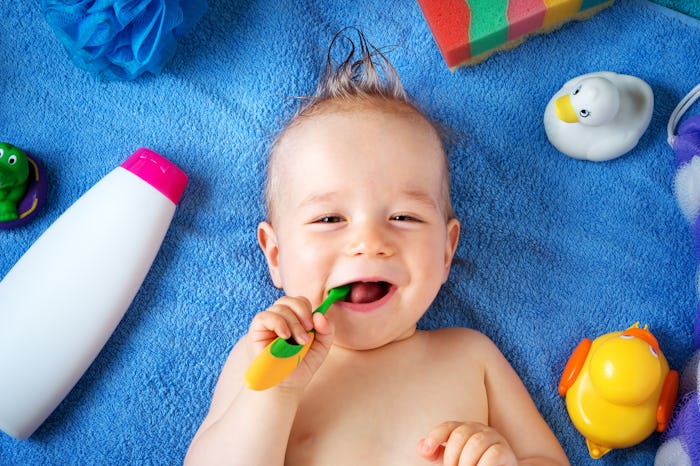Life

How To Safely Care For Baby's Teeth
Dental hygiene — and developing good, hygienic habits early — are very important to a person's overall health and wellbeing. Whether it's brushing twice a day, brushing long enough, or going to the dentist, working on integrating good dental practices in your life can not only save your teeth, but also ward off diseases of the mouth as well as other illnesses. Of course, it's important to start brushing and taking care of your teeth when you're older and have teeth to take care of, but is it safe to brush a baby's teeth?
According to the American Dental Association (ADA), your baby's first teeth should start to come through when she's between 6 and 12 months old. The front, bottom teeth usually come in first, followed by the front top teeth, though the order can vary from child to child. These are, of course, baby teeth, which will fall out as your little one gets older and her secondary set of teeth come in. As soon as you see that first tooth cut through the gums, you should begin to care for it, according to the American Academy of Pediatrics (AAP).
At first, when your baby is still a baby, caring for her tiny teeth is as simple as wiping them with a little gauze or a slightly damp cloth each day after feedings to keep the teeth (and gums) clean. According to Parents, you can also purchase a rubbery device that you slip over your index finger in order to gently clean off her gums and teeth that will take care of any food still in her mouth. As your baby gets a little bit older, it's time to start incorporating a tooth brush, however, as noted on the What To Expect website, it's important to make sure that a baby toothbrush's bristles are very soft and that it's moistened with a bit of water. When they're little, tooth pastes are optional, partially because you want to make sure that your little one won't swallow it. According to the AAP, ensuring that a baby or toddler's teeth are brushed and that any plaque or bacteria is rinsed out of her mouth is more important than worrying too much about tooth paste (or fighting with a stubborn toddler who doesn't like it).
Your baby should take her first trip to the dentist after her first tooth comes in or right around her first birthday, according to the ADA. The dentist can help you pick the right toothbrush to use and give you guidance on toothpastes that your little one might tolerate, as well as advice on how to keep your baby from swallowing it. Your kiddo probably won't be able to brush her teeth (with toothpaste) on her own until she's older, so make sure you either take over tooth brushing duties or at least make sure they're supervised.
Teeth can begin to decay pretty much as soon as they appear, so taking care of your baby's gums, tongue, and teeth from the very beginning can help her develop the habits she needs to keep her mouth healthy over the course of her whole life.